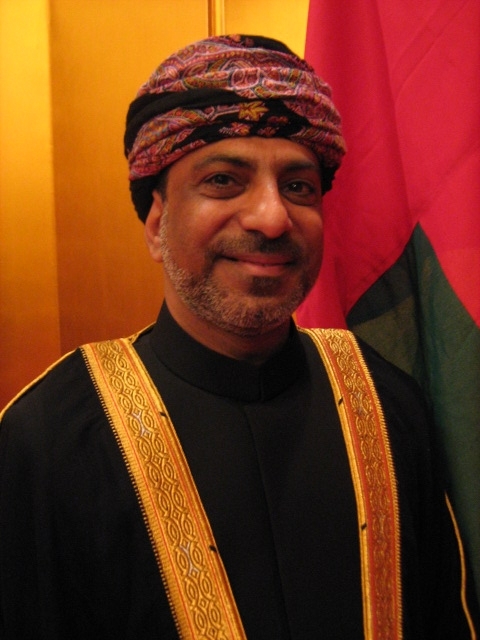
The following was contributed by Omani Ambassador to Korea Mohamed Salim Alharthy on the occasion of the 43rd National Day of the Sultanate of Oman. ― Ed.
Firstly, I’d like to thank The Korea Herald for giving me the opportunity to publish this article about Oman and the friendly relations and cooperation between Oman and Korea. I would also like to express the embassy’s warm greeting and appreciation to our friends in Korea for their marvelous support and assistance in promoting the relations between our two friendly peoples and countries.
Firstly, I’d like to thank The Korea Herald for giving me the opportunity to publish this article about Oman and the friendly relations and cooperation between Oman and Korea. I would also like to express the embassy’s warm greeting and appreciation to our friends in Korea for their marvelous support and assistance in promoting the relations between our two friendly peoples and countries.
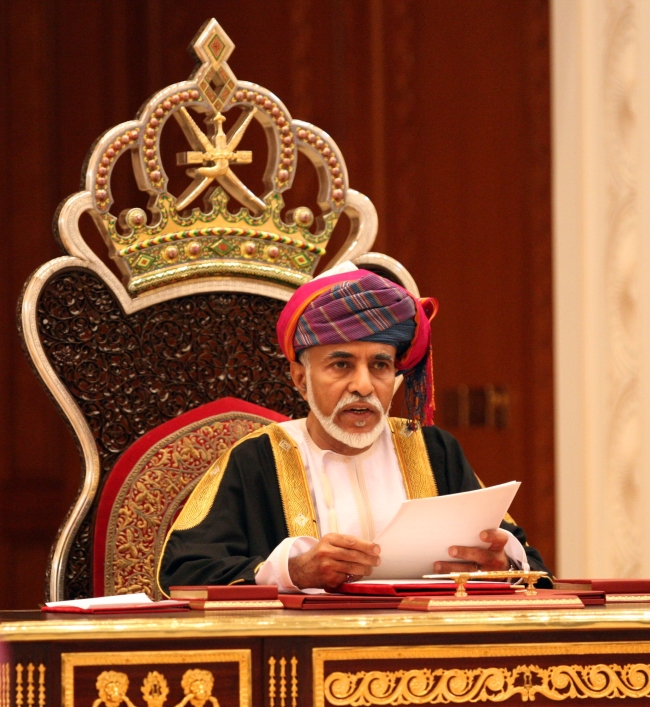
On Nov. 18, 2013, the Omani people celebrate the 43rd National Day while building their country with firm will and strong determination, working sincerely to achieve the goals of the development march. In it, well-studied steps advance toward maintaining the country’s prosperous present and preparing for a bright, dignified future under the astute leadership of Sultan Qaboos bin Said, who directed Oman’s march with prudence and efficiency.
Foreign policy
The basic principles of the Sultanate’s foreign policy stem from the strategic vision of Sultan Qaboos for peaceful coexistence between all peoples, neighborliness, noninterference in the internal affairs of others and mutual respect for national sovereignty.
Omani diplomacy has accorded attention to friendship with the world through good, balanced ties with each country that take positive steps on the way to cooperation and commit to international charters and U.N. principles for achieving progress and consolidating the foundations of international stability.
Based on this clear and deep vision, the Sultanate established its relations with sisterly and friendly states in its capacity as a peace-loving nation always focused on resolving disputes through positive dialogue and by peaceful means. The Sultanate spares no effort in fostering peace, security and stability in its surroundings because it has gained friendship, credibility and esteem, both as a leader and as a state. Oman’s benign efforts and endeavors have succeeded many times in rapprochement and overcoming disputes between sisterly and friendly states in the region and beyond. This has earned Oman more respect at all levels.
Tolerance an authentic trait of Omani identity
The Sultanate of Oman makes tangible efforts in deepening the concept of tolerance. These efforts come, not only in the context of successful Omani diplomacy, but also a deep, wide-scale intellectual discourse to bridge the gaps between nations, cultures and religions and to meet on common humanitarian grounds.
The U.S. State Department’s annual report on religious freedom of 2012 hailed the efforts of the Sultanate in combating religious extremism and reinforcing religious freedom.
Following this initiative, a series of exhibitions titled “Religious Tolerance in Oman” was launched in April 2011. The program was expanded further and renamed “Message of Islam.” The expositions focus on a three-axis theme: religious tolerance, joint understanding and peaceful coexistence.
The exhibition has been expanded further to be held in 16 countries on different continents, namely the United States, Brazil, Australia, Russia, Canada, Portugal, Pakistan, India, Turkey, South Korea, New Zealand, Tanzania, Indonesia and Malaysia. The exhibition works will be translated into 19 languages.
Oman is state of institutions
The efforts of national development aim to build a modern state and a state of institutions as it is a fundamental axis of the modern state’s achievements. The Sultan laid the foundations of the modern state to cope with the age of science and knowledge and maintain its authenticity and originality.
The basic law of the state represents the legal framework for society and the basic foundation of the work and role of the state’s institutions.
The establishment of the Council of Oman (the State council and the Majilis A’Shura “Consultative Council”) was a remarkable sign of developing the Omani consultative system. The Council of Oman consists of the state council, for which Sultan Qaboos appoints its members and the A’Shura Council, whose representatives the Omani people elect from all the (Wilayat) provinces. The Council received a range of legislative and regulatory powers.
The modern omani judiciary enjoys complete independence. This reflects the interest of Sultan Qaboos to achieve the interests of the country and the citizens as well. The amendments of the Basic Law of the State responded to the aspirations of Omani citizens to participate in national development efforts and strengthen the parliament’s legislation that contributed to achieving development and prosperity.
In addition, Sultan Qaboos, since the outset of the renaissance, has always been keen on holding direct meetings with citizens in their areas of residence in the governorates.
The royal meet-the-people tours are not only a prominent cornerstone of the leader’s contact with his people, but also a method of following up on development projects.
These tours have become a means of reinforcing citizens’ political participation in decision making, to bring economic and social development projects closer to the daily needs of citizens, while at the same time highlight priorities at a national level.
Industrial and economic zones
The industry sector constitutes one of the main components of the national economy’s diversification aimed at reducing dependence on oil. This sector’s importance stems from its ability to cover a great volume of society’s need for commodity items, particularly construction materials, in addition to its ability to provide employment opportunities.
The Sultanate seeks to increase the contribution of the converting industries sector to gross domestic product by 15 percent by 2020.
Specialized economic and industrial zones and free zones contribute to enriching business activity, attracting foreign investments and opening up export markets. They are also considered an efficient means of achieving economic goals of transfer of technical expertise and the diversification of sources of income, besides increasing employment opportunities.
Oman adopts a policy of distribution of industrial estates and free zones into the governorates. The Public Establishment for Industrial Estates undertakes the management and operation of seven industrial estates, namely in Al Rusayl, Sohar, Raysut, Nizwa, Sur, Al Buraimi and Samayil, in addition to the Knowledge Oasis Muscat (which focuses on information technology) and the Al Mazyouna Free Zone, which attract projects dealing with commercial and industrial exchange between the Sultanate and Yemen. Work is also underway to establish two new industrial zones.
The setting up of the Special Economic Zone at Duqm on Oct. 26, 2011, is considered a new addition to the national economy. The projects housed in the Special Economic Zone include the Port of Duqm, Al Duqm Dry Dock and a number of tourist and logistic areas. The Sultanate plans to carry out a number of major industrial projects in this zone to attract investments worth $15 billion over the next 10 years.
Free zones provide a package of investment incentives and privileges like exemptions from taxes, streaming of licensing and clearance procedures, import of all goods permissible in the country, exemption from the “lowest limit of investment” condition, free use of currencies, exemption of profits from income tax and other incentives.
Omani ports and railway
Foreign policy
The basic principles of the Sultanate’s foreign policy stem from the strategic vision of Sultan Qaboos for peaceful coexistence between all peoples, neighborliness, noninterference in the internal affairs of others and mutual respect for national sovereignty.
Omani diplomacy has accorded attention to friendship with the world through good, balanced ties with each country that take positive steps on the way to cooperation and commit to international charters and U.N. principles for achieving progress and consolidating the foundations of international stability.
Based on this clear and deep vision, the Sultanate established its relations with sisterly and friendly states in its capacity as a peace-loving nation always focused on resolving disputes through positive dialogue and by peaceful means. The Sultanate spares no effort in fostering peace, security and stability in its surroundings because it has gained friendship, credibility and esteem, both as a leader and as a state. Oman’s benign efforts and endeavors have succeeded many times in rapprochement and overcoming disputes between sisterly and friendly states in the region and beyond. This has earned Oman more respect at all levels.
Tolerance an authentic trait of Omani identity
The Sultanate of Oman makes tangible efforts in deepening the concept of tolerance. These efforts come, not only in the context of successful Omani diplomacy, but also a deep, wide-scale intellectual discourse to bridge the gaps between nations, cultures and religions and to meet on common humanitarian grounds.
The U.S. State Department’s annual report on religious freedom of 2012 hailed the efforts of the Sultanate in combating religious extremism and reinforcing religious freedom.
Following this initiative, a series of exhibitions titled “Religious Tolerance in Oman” was launched in April 2011. The program was expanded further and renamed “Message of Islam.” The expositions focus on a three-axis theme: religious tolerance, joint understanding and peaceful coexistence.
The exhibition has been expanded further to be held in 16 countries on different continents, namely the United States, Brazil, Australia, Russia, Canada, Portugal, Pakistan, India, Turkey, South Korea, New Zealand, Tanzania, Indonesia and Malaysia. The exhibition works will be translated into 19 languages.
Oman is state of institutions
The efforts of national development aim to build a modern state and a state of institutions as it is a fundamental axis of the modern state’s achievements. The Sultan laid the foundations of the modern state to cope with the age of science and knowledge and maintain its authenticity and originality.
The basic law of the state represents the legal framework for society and the basic foundation of the work and role of the state’s institutions.
The establishment of the Council of Oman (the State council and the Majilis A’Shura “Consultative Council”) was a remarkable sign of developing the Omani consultative system. The Council of Oman consists of the state council, for which Sultan Qaboos appoints its members and the A’Shura Council, whose representatives the Omani people elect from all the (Wilayat) provinces. The Council received a range of legislative and regulatory powers.
The modern omani judiciary enjoys complete independence. This reflects the interest of Sultan Qaboos to achieve the interests of the country and the citizens as well. The amendments of the Basic Law of the State responded to the aspirations of Omani citizens to participate in national development efforts and strengthen the parliament’s legislation that contributed to achieving development and prosperity.
In addition, Sultan Qaboos, since the outset of the renaissance, has always been keen on holding direct meetings with citizens in their areas of residence in the governorates.
The royal meet-the-people tours are not only a prominent cornerstone of the leader’s contact with his people, but also a method of following up on development projects.
These tours have become a means of reinforcing citizens’ political participation in decision making, to bring economic and social development projects closer to the daily needs of citizens, while at the same time highlight priorities at a national level.
Industrial and economic zones
The industry sector constitutes one of the main components of the national economy’s diversification aimed at reducing dependence on oil. This sector’s importance stems from its ability to cover a great volume of society’s need for commodity items, particularly construction materials, in addition to its ability to provide employment opportunities.
The Sultanate seeks to increase the contribution of the converting industries sector to gross domestic product by 15 percent by 2020.
Specialized economic and industrial zones and free zones contribute to enriching business activity, attracting foreign investments and opening up export markets. They are also considered an efficient means of achieving economic goals of transfer of technical expertise and the diversification of sources of income, besides increasing employment opportunities.
Oman adopts a policy of distribution of industrial estates and free zones into the governorates. The Public Establishment for Industrial Estates undertakes the management and operation of seven industrial estates, namely in Al Rusayl, Sohar, Raysut, Nizwa, Sur, Al Buraimi and Samayil, in addition to the Knowledge Oasis Muscat (which focuses on information technology) and the Al Mazyouna Free Zone, which attract projects dealing with commercial and industrial exchange between the Sultanate and Yemen. Work is also underway to establish two new industrial zones.
The setting up of the Special Economic Zone at Duqm on Oct. 26, 2011, is considered a new addition to the national economy. The projects housed in the Special Economic Zone include the Port of Duqm, Al Duqm Dry Dock and a number of tourist and logistic areas. The Sultanate plans to carry out a number of major industrial projects in this zone to attract investments worth $15 billion over the next 10 years.
Free zones provide a package of investment incentives and privileges like exemptions from taxes, streaming of licensing and clearance procedures, import of all goods permissible in the country, exemption from the “lowest limit of investment” condition, free use of currencies, exemption of profits from income tax and other incentives.
Omani ports and railway
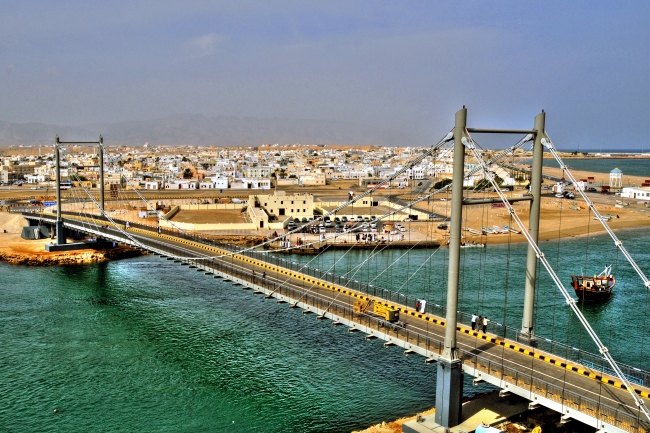
The network of main Omani ports includes Port Sultan Qaboos, established in 1974 as an import and export terminal that witnessed continuous development over the years of the Sultanate’s modern renaissance. In July 2011, the government decided to transform Port Sultan Qaboos into a full-fledged tourism port. The decision provides for the transfer of all import and export activities to Sohar Industrial Port.
The Port of Salalah is accorded great importance due to its vicinity to international maritime routes.
As for Sohar Port, which overlooks the Sea of Oman, its importance is expected to pick up after the start of implementation of the government’s decision to transfer all commercial activities of Port Sultan Qaboos. Sohar Industrial Port will become Oman’s main commercial hub.
Al Duqm Port will revolutionize the Sultanate’s maritime experience. Situated in the Governorate of Al Wusta, the Port of Duqm is considered one of the Sultanate’s most modern ports. The first phase of goods-handling operations at the Port of Duqm began in March 2013.
The Port of Duqm is also distinguished for its strategic location in the vicinity of international maritime trade routes, which offers great chances for attraction of regional and international business, besides activating transport and tourism activity within other Omani ports because this port is located halfway between Qaboos Port in Muscat and the Port of Salalah in Dhofar.
A key facility in Duqm is a project to set up a comprehensive city to serve as a center for attraction of maritime transport activity, besides serving the planned industrial city which will include a refinery, petrochemical industries and workshops for the repair of ships and tug boats. The facilities also include fisheries-based industries, logistic complexes and big stores. The area is expected to be the Sultanate’s main industrial center attracting both domestic and foreign investments, thereby expanding the country’s economic production platform. The volume of investments at the Port of Duqm is expected to touch RO 1.7 billion after the completion of the rest of infrastructure stages.
The Sultanate’s main ports network also includes the Port of Khasab. Other ports in the Sultanate include Shinas.
The railway project is considered a complementing part of the land transport network in the Sultanate and a new facility which will enhance the national economy and support the sustainable development process. The railway will also reinforce transport networks between the Sultanate and the United Arab Emirates. It will enable the ports of Sohar, Duqm and Salalah to become the main gateways of import and export for GCC states, thereby keeping the Sultanate on the helm of the maritime transport industry.
The railway project extends for 1,687 kilometers. The project of detailed designs and construction is expected to be floated for specialized international companies by the first half of 2014.
Investment opportunities
Oman has worked to attract investment over the past years by creating a suitable climate to attract foreign investments and stimulate domestic businesses. It improves the economic environment and creates encouraging incentives.
Oman enjoys many investment features, which have enabled it to attract domestic and foreign investment, including security, political stability and the application of a free economic system. It allows foreigners to own projects without any restrictions on the transfer of funds to outside the country, and there is no tax on the income of individuals. Also, it gives uniform tax treatment to all companies, both Omani and foreign institutions, at 12 percent annually.
There are many investment opportunities and major ongoing projects and many more to come, such as a railroad project, a medical city, an education city, ports, airports, tourism projects, petrochemical projects, and many other construction projects. We invite Korean companies to take the opportunity to participate in these projects. The embassy is keen on providing support and cooperation to Korean companies.
Culture and tourism
The Port of Salalah is accorded great importance due to its vicinity to international maritime routes.
As for Sohar Port, which overlooks the Sea of Oman, its importance is expected to pick up after the start of implementation of the government’s decision to transfer all commercial activities of Port Sultan Qaboos. Sohar Industrial Port will become Oman’s main commercial hub.
Al Duqm Port will revolutionize the Sultanate’s maritime experience. Situated in the Governorate of Al Wusta, the Port of Duqm is considered one of the Sultanate’s most modern ports. The first phase of goods-handling operations at the Port of Duqm began in March 2013.
The Port of Duqm is also distinguished for its strategic location in the vicinity of international maritime trade routes, which offers great chances for attraction of regional and international business, besides activating transport and tourism activity within other Omani ports because this port is located halfway between Qaboos Port in Muscat and the Port of Salalah in Dhofar.
A key facility in Duqm is a project to set up a comprehensive city to serve as a center for attraction of maritime transport activity, besides serving the planned industrial city which will include a refinery, petrochemical industries and workshops for the repair of ships and tug boats. The facilities also include fisheries-based industries, logistic complexes and big stores. The area is expected to be the Sultanate’s main industrial center attracting both domestic and foreign investments, thereby expanding the country’s economic production platform. The volume of investments at the Port of Duqm is expected to touch RO 1.7 billion after the completion of the rest of infrastructure stages.
The Sultanate’s main ports network also includes the Port of Khasab. Other ports in the Sultanate include Shinas.
The railway project is considered a complementing part of the land transport network in the Sultanate and a new facility which will enhance the national economy and support the sustainable development process. The railway will also reinforce transport networks between the Sultanate and the United Arab Emirates. It will enable the ports of Sohar, Duqm and Salalah to become the main gateways of import and export for GCC states, thereby keeping the Sultanate on the helm of the maritime transport industry.
The railway project extends for 1,687 kilometers. The project of detailed designs and construction is expected to be floated for specialized international companies by the first half of 2014.
Investment opportunities
Oman has worked to attract investment over the past years by creating a suitable climate to attract foreign investments and stimulate domestic businesses. It improves the economic environment and creates encouraging incentives.
Oman enjoys many investment features, which have enabled it to attract domestic and foreign investment, including security, political stability and the application of a free economic system. It allows foreigners to own projects without any restrictions on the transfer of funds to outside the country, and there is no tax on the income of individuals. Also, it gives uniform tax treatment to all companies, both Omani and foreign institutions, at 12 percent annually.
There are many investment opportunities and major ongoing projects and many more to come, such as a railroad project, a medical city, an education city, ports, airports, tourism projects, petrochemical projects, and many other construction projects. We invite Korean companies to take the opportunity to participate in these projects. The embassy is keen on providing support and cooperation to Korean companies.
Culture and tourism
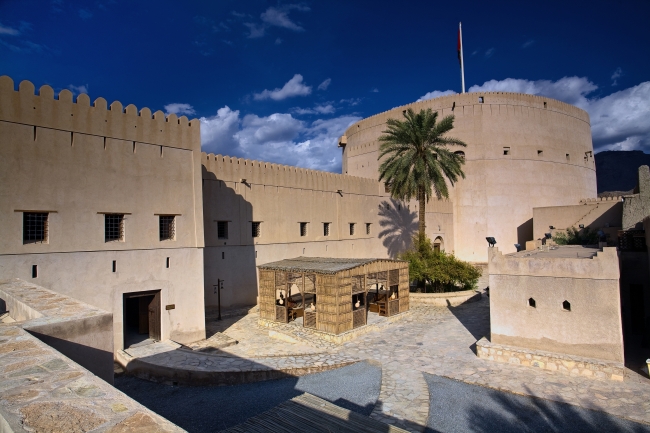
Oman enjoys an unspoiled culture and traditional lifestyle in almost every aspect of life which is derived from the Islamic religion. The Omanis are a society committed to kindness, friendship, hospitality and the value of the family as the solid foundation of life. Arabic is the official language; English is considered a second language and widely used in the business sector. Oman has rich cultural values, art, handicrafts and folkloric performances. There are a number of UNESCO-classified World Heritage sites in Oman. The Royal Orchestra of Oman is considered one of the best worldwide, and the Royal Opera House recently opened as an example of its appreciation of art.
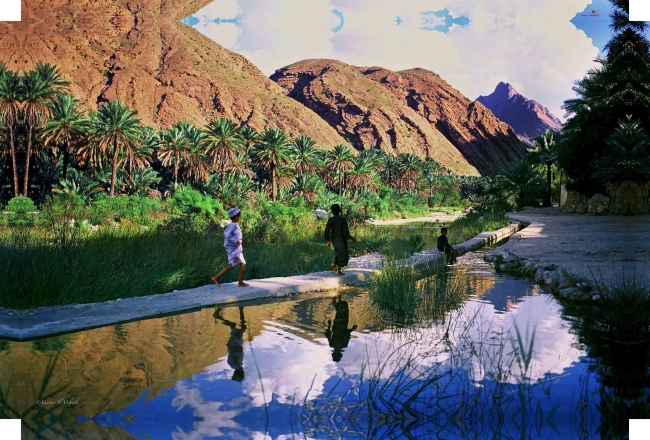
Oman is a beautiful country with many appealing sites and destinations. The popularity of Oman is mainly due to its geological structure, beautiful landscapes, mountains, deserts and Wadis, with green oases of palm trees, heritage, etc. Oman also has some exotic beaches with crystal clear and sparkling water and luxurious resorts and hotels, restaurants, etc. Some of the interesting attractions of Oman include Muscat, Nizwa, Sohar, Salalah and Sur. Oman is rich in nature, culture, heritage as well as interesting activities such as scuba diving, boating, climbing, trekking, camping, golf, shopping and watching whales, dolphins, turtles and birds. In addition, tourists can enjoy camel and horse racing and the souks and villages of Oman, Beduion tents in the desert and camel riding.
Oman-Korea relations
Oman-Korea relations date back more than a thousand years, when Omani merchants met their Korean counterparts on their way to China. In modern times, they established diplomatic relations in 1974. Since then, Oman―Korea relations witnessed a remarkable development in various fields.
Korea is regarded a major trading partner of Oman, and both countries engage in numerous economical exchanges and cooperation. Oman provides large quantities of oil and LNG to Korea.
On the other hand, Korea exports many industrial products, including automobiles, vessels, hi-tech electronics and electric goods to Oman.
Moreover, many Korean companies such as GS, Daewoo, Hyundai, Doosan, Hanjin and others are contributing to the development of Omani infrastructure and other major projects.
The Oman-Korea Joint Committee is playing a pivotal role in promoting and developing the cooperation between the two countries. During the third round of meetings held in Seoul on Nov. 12, many topics of mutual interest were discussed such as trade, investment, information security, health, renewable energy, electricity and water, railways, vocational education and maritime transport.
To reflect the strong ties, an exchange visit from both sides has taken place. Lately, Oman’s minister of oil and gas and minister of health visited Korea. The Minister of Health discussed mutual cooperation in health care, and an MOU in health care services was signed between Oman and Korea.
Oman has also participated in many international events and conferences which have taken place in Korea such as the World Energy Congress, the Seoul Conference on Cyberspace, the e-government conference and others.
To promote cultural exchange, the Embassy of the Sultanate of Oman in the Republic of Korea participated in various events such as Hi-Seoul and the Arab Cultural Festival. In addition, it organized some cultural events including the open house program which invites Korean guests to visit the embassy and take a look at the culture, heritage and history of Oman. Likewise, the Korean embassy in Oman is playing a major role in promoting Korean culture. These cultural exchange programs promote understanding among people, which in turn contributes to enhancing relations and cooperation between Oman and Korea.
In conclusion, I would like to invite the Korean people to visit Oman, explore the culture, tourism landmarks and also invite Korean companies to participate in the investment opportunities of various projects. I’m confident that our relations and cooperation in the coming years will witness further enhancement and development. Ultimately, I give my heartfelt wishes to the Korean people and government for further success and progress, and further development and prosperity of Oman-Korea relations.
Oman-Korea relations
Oman-Korea relations date back more than a thousand years, when Omani merchants met their Korean counterparts on their way to China. In modern times, they established diplomatic relations in 1974. Since then, Oman―Korea relations witnessed a remarkable development in various fields.
Korea is regarded a major trading partner of Oman, and both countries engage in numerous economical exchanges and cooperation. Oman provides large quantities of oil and LNG to Korea.
On the other hand, Korea exports many industrial products, including automobiles, vessels, hi-tech electronics and electric goods to Oman.
Moreover, many Korean companies such as GS, Daewoo, Hyundai, Doosan, Hanjin and others are contributing to the development of Omani infrastructure and other major projects.
The Oman-Korea Joint Committee is playing a pivotal role in promoting and developing the cooperation between the two countries. During the third round of meetings held in Seoul on Nov. 12, many topics of mutual interest were discussed such as trade, investment, information security, health, renewable energy, electricity and water, railways, vocational education and maritime transport.
To reflect the strong ties, an exchange visit from both sides has taken place. Lately, Oman’s minister of oil and gas and minister of health visited Korea. The Minister of Health discussed mutual cooperation in health care, and an MOU in health care services was signed between Oman and Korea.
Oman has also participated in many international events and conferences which have taken place in Korea such as the World Energy Congress, the Seoul Conference on Cyberspace, the e-government conference and others.
To promote cultural exchange, the Embassy of the Sultanate of Oman in the Republic of Korea participated in various events such as Hi-Seoul and the Arab Cultural Festival. In addition, it organized some cultural events including the open house program which invites Korean guests to visit the embassy and take a look at the culture, heritage and history of Oman. Likewise, the Korean embassy in Oman is playing a major role in promoting Korean culture. These cultural exchange programs promote understanding among people, which in turn contributes to enhancing relations and cooperation between Oman and Korea.
In conclusion, I would like to invite the Korean people to visit Oman, explore the culture, tourism landmarks and also invite Korean companies to participate in the investment opportunities of various projects. I’m confident that our relations and cooperation in the coming years will witness further enhancement and development. Ultimately, I give my heartfelt wishes to the Korean people and government for further success and progress, and further development and prosperity of Oman-Korea relations.
-
Articles by Korea Herald








![[Graphic News] More Koreans say they plan long-distance trips this year](http://res.heraldm.com/phpwas/restmb_idxmake.php?idx=644&simg=/content/image/2024/04/17/20240417050828_0.gif&u=)
![[KH Explains] Hyundai's full hybrid edge to pay off amid slow transition to pure EVs](http://res.heraldm.com/phpwas/restmb_idxmake.php?idx=644&simg=/content/image/2024/04/18/20240418050645_0.jpg&u=20240419100350)






![[From the Scene] Monks, Buddhists hail return of remains of Buddhas](http://res.heraldm.com/phpwas/restmb_idxmake.php?idx=652&simg=/content/image/2024/04/19/20240419050617_0.jpg&u=20240419175937)

![[KH Explains] Hyundai's full hybrid edge to pay off amid slow transition to pure EVs](http://res.heraldm.com/phpwas/restmb_idxmake.php?idx=652&simg=/content/image/2024/04/18/20240418050645_0.jpg&u=20240419100350)

![[Today’s K-pop] Illit drops debut single remix](http://res.heraldm.com/phpwas/restmb_idxmake.php?idx=642&simg=/content/image/2024/04/19/20240419050612_0.jpg&u=)